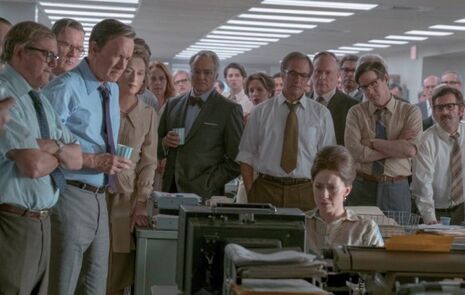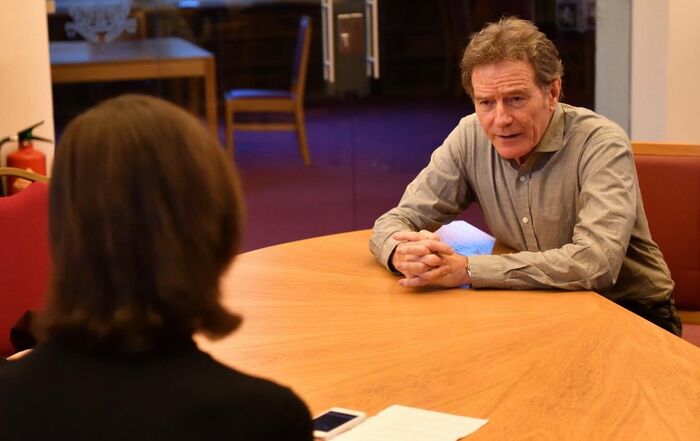The Post review: ‘uncomfortably Pyrrhic’
Hoping for the best and receiving the worst, Lillian Crawford can only hope Spielberg will put in more effort next time

Varsity goes to print in half an hour. Start the clock. Steven Spielberg, plenty of bold moments between vulgar nationalist sentimentality. Meryl Streep and Tom Hanks on-board, guaranteed Oscar nods. Furnish proceedings with a swelling John Williams score and we are off. Seth Meyers opens the Golden Globes with a woman rushing on with an armful of awards for The Post. Whack a bunch of stars at the top of the review and the presses are rolling...
Or so it would seem. Not one of these titans so much as touched an award. Surely, if nothing else, Spielberg can tell a damn good story - but what is the scoop here? We open in the disarray of Vietnam, 1966. Between the bullets and hellfire, the camera lands on a typewriter, the mightier-than-the-sword moral blinding in its blatancy. Our focus is set on it, ignorant of the men being slaughtered around us.
"For pity’s sake, don’t forget to take a napkin!"
The awards deadline in Spielberg’s sight, he races towards it, a prescient motion picture too tantalising for him to ignore. The proposed product is a hackneyed criticism of President Trump’s press restrictions through the sins of Richard Nixon, a literal puppet on Spielberg’s string as an overly-animated actor mimics real audio files. What we actually receive is a film about an elite band of wealthy journalists struggling to safeguard their reputations. Had Spielberg shown the same concern, we might have been spared such mediocrity.
Following the dizzying handheld shots at the start, one assumes there will be greater stasis in the newsroom. Au contraire, the camera is tossed and turned, Spielberg seemingly handing it to inexperienced randoms wandering about aimlessly. Several scenes might have been shot by a small child, forcing us to stare up at smug-looking actors delivering mind-numbingly simple dialogue from the floor. The only parts worth watching are the printing presses in action, although one imagines the same effect could have been created by a BBC4 documentary.
Williams’ score mostly consists of dining club light music, the remainder mere drafts for the build-ups to his grandest themes. Equally mediocre are The Post’s stars, Streep spending half her (limited) screen time draped in robes that give the impression she could not be bothered to get dressed. In some scenes she does not manage to get out of bed at all.
Alas, she does a far better job than Hanks, who irritates the viewer with a series of ill-informed ticks that distract from the mundanity of Liz Hannah and Josh Singer’s screenplay. We spend an inordinate amount of the film watching him extinguish unsmoked cigarettes, flick a lighter he barely uses, and render Sarah Paulson a completely useless character, serving only to pass round sandwiches while the gents do their little newspaper thing. For pity’s sake, don’t forget to take a napkin!
At the end of the otherwise excellent Bridge of Spies, a group of children jump over a wall in a hideously executed punch-the-air-and-God-bless-America moment. The Post is smattered with its like, one in which Hanks and Streep confidently fold their arms at the camera forces one to physically recoil. It is a victory that feels uncomfortably Pyrrhic - they, like us, have left the lives at stake deep in the mud of the Vietnamese jungle, and yet have apparently risked 'everything' to do so.
The message is driven home by an eye-rolling climax at the Watergate Hotel, reminding us that we would have been better off re-watching All the President’s Men. Instead, what we are left with just feels a bit, to use the film’s favourite PG-13-word, shit.
 News / Right-wing billionaire Peter Thiel gives ‘antichrist’ lecture in Cambridge6 February 2026
News / Right-wing billionaire Peter Thiel gives ‘antichrist’ lecture in Cambridge6 February 2026 News / Cambridge students uncover possible execution pit9 February 2026
News / Cambridge students uncover possible execution pit9 February 2026 News / Epstein contacted Cambridge academics about research funding6 February 2026
News / Epstein contacted Cambridge academics about research funding6 February 2026 News / Man pleads guility to arson at Catz8 February 2026
News / Man pleads guility to arson at Catz8 February 2026 News / John’s duped into £10m overspend6 February 2026
News / John’s duped into £10m overspend6 February 2026










